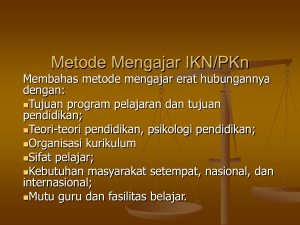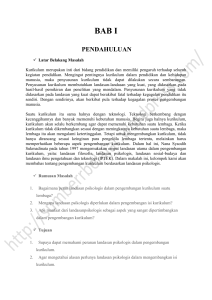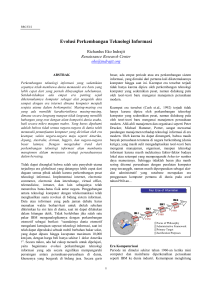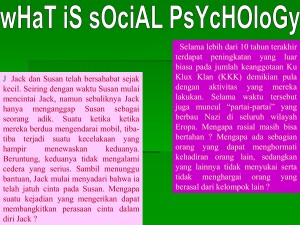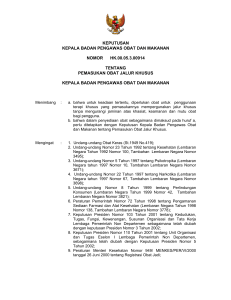Shadiqi, Abstrak
advertisement
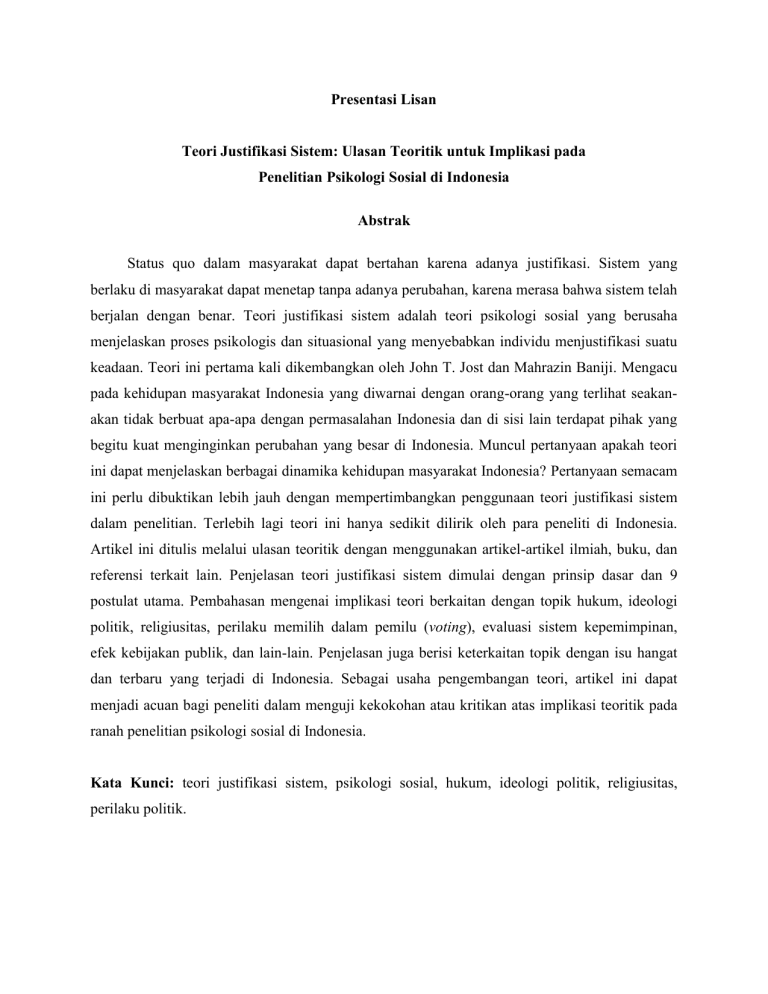
Presentasi Lisan Teori Justifikasi Sistem: Ulasan Teoritik untuk Implikasi pada Penelitian Psikologi Sosial di Indonesia Abstrak Status quo dalam masyarakat dapat bertahan karena adanya justifikasi. Sistem yang berlaku di masyarakat dapat menetap tanpa adanya perubahan, karena merasa bahwa sistem telah berjalan dengan benar. Teori justifikasi sistem adalah teori psikologi sosial yang berusaha menjelaskan proses psikologis dan situasional yang menyebabkan individu menjustifikasi suatu keadaan. Teori ini pertama kali dikembangkan oleh John T. Jost dan Mahrazin Baniji. Mengacu pada kehidupan masyarakat Indonesia yang diwarnai dengan orang-orang yang terlihat seakanakan tidak berbuat apa-apa dengan permasalahan Indonesia dan di sisi lain terdapat pihak yang begitu kuat menginginkan perubahan yang besar di Indonesia. Muncul pertanyaan apakah teori ini dapat menjelaskan berbagai dinamika kehidupan masyarakat Indonesia? Pertanyaan semacam ini perlu dibuktikan lebih jauh dengan mempertimbangkan penggunaan teori justifikasi sistem dalam penelitian. Terlebih lagi teori ini hanya sedikit dilirik oleh para peneliti di Indonesia. Artikel ini ditulis melalui ulasan teoritik dengan menggunakan artikel-artikel ilmiah, buku, dan referensi terkait lain. Penjelasan teori justifikasi sistem dimulai dengan prinsip dasar dan 9 postulat utama. Pembahasan mengenai implikasi teori berkaitan dengan topik hukum, ideologi politik, religiusitas, perilaku memilih dalam pemilu (voting), evaluasi sistem kepemimpinan, efek kebijakan publik, dan lain-lain. Penjelasan juga berisi keterkaitan topik dengan isu hangat dan terbaru yang terjadi di Indonesia. Sebagai usaha pengembangan teori, artikel ini dapat menjadi acuan bagi peneliti dalam menguji kekokohan atau kritikan atas implikasi teoritik pada ranah penelitian psikologi sosial di Indonesia. Kata Kunci: teori justifikasi sistem, psikologi sosial, hukum, ideologi politik, religiusitas, perilaku politik. System Justification Theory: Theoretical Review for Implications on Research of Social Psychology in Indonesia Abstract Status quo in society can hold out because justification. The prevailing system in society can be persistent survive without desire to change because they feel the system has been worked correctly. System justification theory is theory of social psychology that explain about psychological and situational processes when people justify a condition. This theory was first developed by John T. Jost and Mahzarin Baniji. If we look at the society life in Indonesia, some people is seen not doing anything with Indonesia’s problems. On the other side, some people try strongly to make substantial changes in Indonesia. Thus, whether the system justification theory can explain the various dynamics of Indonesian people? The question like that must be proved with considering the utility of system justification theory in psychology research, especially in Indonesia. The problem is this theory was not much tested by psychology researcher in Indonesia. This article was written with theoretical review from empirical articles, book, and other references. The first explanation is basic principles and major postulates of system justification theory. The theoritical implications this theory for psychology studies in Indonesia can relate with law, political ideology, religiosity, voting behavior, evaluation with leadership system, the effect of public policy and other topics. This explanations also contains the relation of this topics and recent issues that occurred in Indonesia. This theoretical review can be a reference to supports or give critics for the theoretical implications of system justification theory to social psychology study in Indonesia. Keyword: system justication theory, social psychology, law, political ideology, religiosity, political behavior. Identitas Penulis Nama : Muhammad Abdan Shadiqi, S.Psi Institusi : Fakultas Psikologi, Universitas Indonesia No Handphone: 0813 4955 8346 E-mail : [email protected] atau [email protected]
